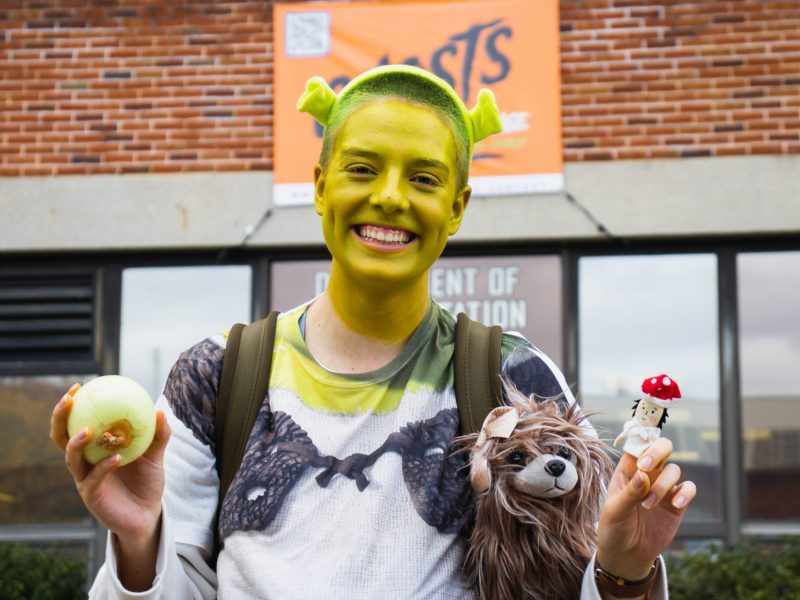It’s been downloaded more than 100 million times. It’s led to more than 10 billion “matches.” It claims that more than half of its users are ages 18 to 24.
But it’s also something with which many apparently are still uncomfortable.
I’m talking about Tinder, of course, the location-based dating application that’s swiped right into the hearts of millions of date-seeking millennials.
The app, for Tinder virgins, is fairly simple to use: Put up a couple pictures of yourself, slap together a short bio with a good punch line or two and start viewing the profiles of other people in the area. Think a person is cute? Swipe right and hope they did the same, which results in a “match” that lets you two start your own private chat. Not interested? Swipe left, and move on to that next piece of eye candy. Find someone absolutely enticing? “Super Like” them, which notifies them of your interest.
It’s fun, it’s easy and it’s a great confidence booster. It’s also an easy way for a busy college kid to meet that special person hidden among the thousands of other students whizzing throughout the campus. Yet time and time again, both through my own personal interactions and comments I’ve read online, a good portion of people seem wary of building a committed relationship through the app.
If you’ve been on Tinder before, you’ve likely seen someone with a bio along the lines of “I’m willing to lie about how we met.” The implication here is that it is somehow wrong to have met your lover online. Instead, it suggests, a proper romance should begin with the wistful glance across the room, the awkward first conversation that leaves you feeling like a bumbling fool and the storybook ending as the two of you divulge your innermost secrets while gazing up at the clear night sky dotted with radiant stars.
How often does that stuff actually happen in real life? My guess, in this era when more and more people are becoming dependent on technology, would be not that often. All of our lives can’t be as magical as the beginning of The Notebook, after all. So why does the notion persist that it is somehow embarrassing to found a relationship through Tinder?
Some of the blame can be laid on the app’s growing reputation as a “hookup app.” It’s not an untrue statement — talk to a few people on the app if you need proof — but a good portion of users seem to be looking for something more, at least in my experiences. It might be that for gay men, Tinder is the option for guys looking for something more long-term because if you’re looking for quick fun, you can just go check out Grindr. In essence, the duo of apps is a natural filter of different-minded people.
However, it seems that straight men and women, lacking another dating app with the scope of Tinder, don’t have that luxury. Instead, everyone is lumped together in Tinder, desperately trying to find their next Romeo or Juliet in a sea of “whatchu doin tonight??”
But even that shouldn’t matter. How many couples met during college parties, a hotbed for hookups themselves? Or were first introduced the second they started making out at R.J. Bentley’s on a Tuesday night? It’s sure to be a fair number, and a portion of those couples likely have a great relationship today, “love at first sight” story or not. (The official portion of marriages and committed relationships that originated from online dating, according to a 2016 Pew Research Center study, currently sits at 5 percent, and is likely to grow as apps like Tinder grow more commonplace.)
Either way, the point is that your first interaction or where it happened isn’t all that important; what matters is what happens afterward. Sure, maybe you matched with your current girlfriend during a 2 a.m. swiping spree after you had one too many Jägerbombs, but what’s the issue with that if you’ve already met each other’s parents, survived the first Valentine’s Day and are approaching your one-year anniversary? Things are going well, and you should be proud you met on Tinder, goddammit.
Yet there’s another class of anxious people who can’t even move beyond the initial swipe to the first date, let alone worry about framing their relationship forged in the flames of Tinder. One-third of people who use online dating sites have never gone on a date with someone from those apps, according to the Pew study. Perhaps they are afraid of meeting a virtual stranger in public, but there are certain ways to ensure your safety, like having the first date in a public place and letting your friends know where you’re going and when you should be back. Or maybe they are afraid of the awkward first in-person encounter, which is understandable but also glosses over the fact that all first dates are inherently uncomfortable.
It’s no secret that Tinder sometimes gets a bad rap, and it’s also no secret that the app isn’t for everyone. Maybe you prefer to meet your next romantic interest in person, a noble goal and one I applaud you on. But maybe that plan hasn’t been working out for you, and now social dating apps seem like your best shot.
So have at it. Swipe like crazy. “Super Like” someone, even. But if a match turns into a date and the date turns into a relationship, just be sure to answer “Tinder” loudly and proudly when someone asks how you met.



